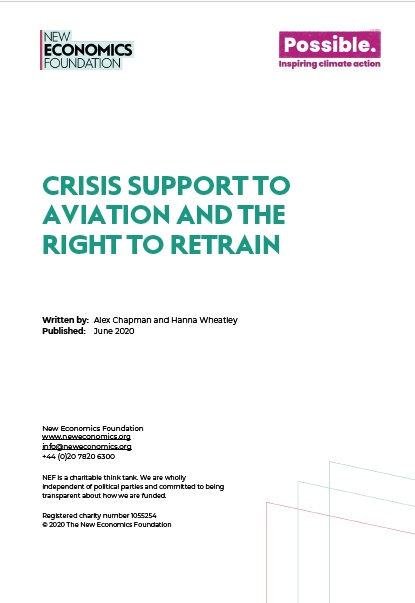Aviation industrial relations and trade union strategies during and after COVID-19 crisis
July 6, 2020

A recent report by the New Economics Foundation (NEF), a left-leaning think tank based in the UK drafted in consultation with aviation unions and the Trades Union Congress (TUC) propose a co-ordinated sector-wide package to support workers in the aviation industry in transitioning through a period of disruption and uncertainty.
Published last month, the 25-page report, “Crisis Support to Aviation and the Right to Retrain,” sets out concrete proposals for a socially responsible recovery plan for the British aviation industry. In the own words of the report, “The proposals seek to address both the short-term crisis created by the disruption to travel caused by Covid-19 and subsequent government policy to address the crisis as well as proposals to address the longer term challenges of new technology, automation and climate change within the sector.”
The report is intended as an urgent intervention to make the case for both short-term and longer-term support for the sector to enable it to recover from COVID-19 and address the challenges of new technology, automation and climate change.
ITF civil aviation secretary Gabriel Mocho commented: “This report is inspiring. Its proposals are in line with the ITF’s demands to address the impact of COVID-19. It also goes beyond immediate demands and sets a concrete example of what the principle of a just transition should look like in practice in the longer-term. I am sure our aviation affiliates all around the world will find it inspiring and useful as well.”
The authors of the NEF report, Alex Chapman and Hanna Wheatley, summarise the proposals contained in the report as follows:
- A new bespoke, industry-wide, crisis support plan and package for aviation, with oversight from a new sector panel with representation from unions, businesses and government.
- Commitment to a union-negotiated limit on redundancy rates across the industry.
- Delivery of a new skills and employment strategy, including conversion of the job retention scheme into a new job re-skilling programme which protects employment while workers are supported to transition into alternative roles.
- Accelerating the Government’s review of aviation sector tax arrangements and introduction of new mechanisms which ensure a fair contribution from all employers to the costs of the retraining programme.
- Ensuring a fair public return on bailouts. Taking equity stakes in all large businesses bailed out in the aviation sector, and attaching the right to take further stakes (warrants) with any other financial support. Attaching conditions to all financial support to suspend shareholder dividends, to end excessive executive pay and unethical tax practices, and to require investment in green technology and decarbonisation.
Tags: COVID-19, NEF, New Economics Foundation, protecting jobs, TUC, union demands
